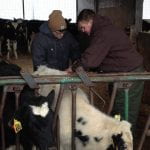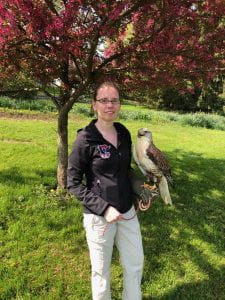ANSC 2210: Principles of Animal Genetics
Lecture Tues/Thurs, 9:05-9:55; Discussion either T/W/Th 2-4:30
As an introduction to animal genetics, this course will focus on the genetic foundation and improvement of domestic and livestock species. There will be a review of basic cellular biology and DNA replication to lay the groundwork for understanding the genetic mechanisms underlying traits, modern genomic tool development, and analysis methods. Critical thinking towards animal breeding and management will require an understanding of heritability, population dynamics, rate of selection, and genetic and economic gain. Software and reference programs will be used to investigate animal genes and genomes, individual genotypes through DNA sequence or whole-genome marker panels, and statistical associations between traits and genetic markers. Modern examples (domestic, livestock, wildlife, human), practical applications (diagnostic tests, genetic evaluations), and hands-on tools (DNA extraction & computer analysis, CyberSheep) will be key components of this class in order to appreciate the intricacies of genetics and the future of genomic research for the improvement and management of animals.
ANSC 2510: Applied Dairy Cattle Genetics
 Spring, 2 credits, offered every other year – odd number years
Spring, 2 credits, offered every other year – odd number years
Lecture Tues/Thurs, 12:20-1:10pm
Course will review the current knowledge base of dairy cattle genetics including the genetic regulation of diseases, production, and health traits. Genomic evaluation scores will be assessed with an emphasis on how to prioritize and balance genetic selection towards long-term sustainability. Mating strategies will be evaluated for the achievement of goals and impact on both the individual animal and overall herd.
 The Cornell Raptor Program is an undergraduate volunteer organization focused on providing education on captive raptor management and conservation to the students and the public. It was established in 1993 and houses over 30 non-releasable hawks, eagles, owls, and falcons that volunteer students are trained to handle and care for and use in public education programs. I have been the Director of the Cornell Raptor Program since 2016.
The Cornell Raptor Program is an undergraduate volunteer organization focused on providing education on captive raptor management and conservation to the students and the public. It was established in 1993 and houses over 30 non-releasable hawks, eagles, owls, and falcons that volunteer students are trained to handle and care for and use in public education programs. I have been the Director of the Cornell Raptor Program since 2016.
The Cornell Raptor Program has focuses on four main areas:
-
-
- Student and public education programs on raptor conservation and natural biology
- Participation in research endeavors involving raptors
- Captive propagation and release of selected raptorial species
- Rehabilitation of sick or injured raptors
-
*The Cornell Raptor Program is funded through grants, public donations, and an its outreach education programs.
Read a short profile of the Cornell Raptor Program in our Field Note section written by student volunteer, Caroline Stamm ’24.
For regular updates on the program please follow our Cornell Raptor Program Facebook page!
